Original story published on College of Engineering Blog, 11/10/2022

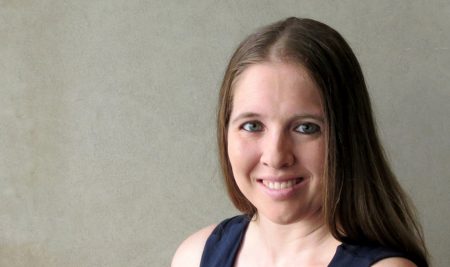
Carolyn Duncan shares her knowledge on Husky Bites, a free, interactive Zoom webinar this Monday, 11/14 at 6 pm ET. Learn something new in just 30 minutes or so, with time after for Q&A! Get the full scoop and register at mtu.edu/huskybites.
What are you doing for supper this Monday night 11/14 at 6 ET? Grab a bite with Carolyn Duncan, assistant professor, Kinesiology and Integrative Physiology and Affiliated Assistant Professor, Cognitive and Learning Sciences at Michigan Tech.
Joining in will be Sarah Aslani, Applied Cognitive Science and Human Factors (ACSHF) PhD student and a member of Prof. Duncan’s MTU Balance and Functional Mobility Lab at Michigan Tech, who will share just how balance is studied in the lab.
Falls are a major cause of serious injury and death in our society. So how can we prevent them?

“We need greater understanding of exactly what affects our ability to regain our balance when we lose it,” Duncan explains. “Not all risk factors affect balance in the same way. There are many unanswered questions, and that’s where our research comes in,” she says.
How do we anticipate falling? And what happens if we are distracted?
“There’s a lot we still don’t understand in respect to balance,” she says. Some major culprits, though: clutter and poor lighting.
During Husky Bites, Prof. Duncan will explore what is currently known on how we regain our balance, share some things we can do to improve our balance and prevent falls, and discuss her ongoing research on balance control and fall prevention.

Duncan earned her BSc in Kinesiology and MSc in Occupational Biomechanics, both at the University of New Brunswick, and her PhD in Mechanical Engineering with a focus on biomechanics at Memorial University of Newfoundland. She was a postdoctoral fellow in Neuroscience at the University of Waterloo in the Toronto Rehabilitation Institute, then taught engineering ergonomics courses at Virginia Tech before joining the faculty at Michigan Tech in 2018.
After obtaining her doctorate in mechanical engineering, Prof. Duncan spent time working as an ergonomist and fall prevention specialist before she became a researcher. Her work has spanned from fall prevention in offshore industries to developing fall prevention safety programs for workplaces. These experiences give her valuable real-world insights in the fall-related challenges people face in everyday life.
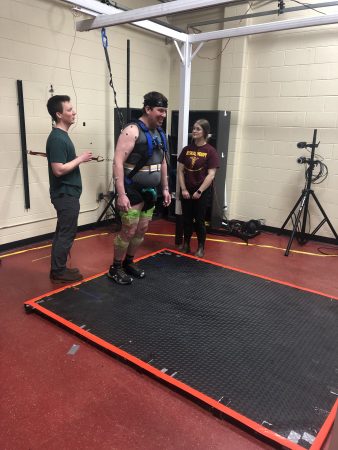
At Michigan Tech, Duncan investigates factors that influence successful balance recovery—from lighting, load-carrying, and aging, to cognitive, neurological, and physical disorders and musculoskeletal injury. She also works with the design of built environments for older adults and special populations.
“My research primarily focuses on the factors that influence successful balance recovery to prevent falls and improve mobility,” she explains.
Her work studying balance recovery in moving environments—such as the wave motion encountered in maritime settings—involves asking questions, such as “would dancers have better balance on a boat?”
(Prof. Duncan found that while dancers demonstrated significantly fewer stumbling events when on a simulated boat than novices during the first trial, dancers did not perform as well as individuals with offshore experience.)

Arriving recently from the warmer climate of Tehran to earn her PhD in Cognitive Learning Sciences in Michigan’s Upper Peninsula, Aslani has not yet experienced a Houghton winter, or ever slipped on the ice and snow. Thankfully, she is co-advised by Prof. Duncan and Kevin Trewartha, an assistant professor with joint appointment in CLA and KIP. They’re already preparing Aslani for what to expect when the snowflakes start to fly and temperatures dip.
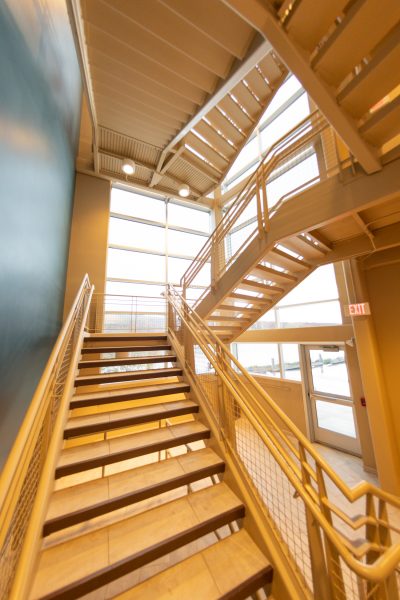
“Sarah has a background in biomedical engineering, and she just started this semester,” says Duncan. “She will be doing her PhD research on factors that influence our ability to recover our balance. I look forward to furthering this area of research with her in the upcoming years. And we look forward to teaching her how to snowboard and ski as part of our Lab bonding time.”
“I was looking for a research project that would cover both of my interests—biology and neuroscience—when I saw Dr. Duncan’s profile on the Michigan Tech website,” adds Aslani. “So I sent her an email. Then, in our first meeting, it really felt right. I knew this would be a place where I’d fit in.”
In the lab, Duncan and her team perform balance control research. Their overall goal: to help improve the lives of individuals in our community.
“Type 2 Diabetes is a big challenge facing many older adults, with devastating effects on balance. However, surprisingly, very little is known about how exercises like Tai Chi may decrease fall risk. My team is excited to start examining how effective lost-cost group exercise programs like Tai Chi, for improving balance and decreasing risk of falls. We’ll be working in collaboration with Dr. Kevin Trewartha and physical therapists Dr. Cameron Williams and Dr. Lydia Lytle,” Duncan says.
“Dim lighting is often associated with falls in the home,” she adds. “We’re currently looking into how lighting specifically affects balance recovery. We hope this knowledge will be used to develop guidelines on optimal lighting in homes and built environments in our community to decrease risk of falls.’
During Husky Bites, Prof. Duncan promises to offer some takeaways, too. She’ll provide exact details on the best kinds of shoes, railings and stairs to prevent falls.
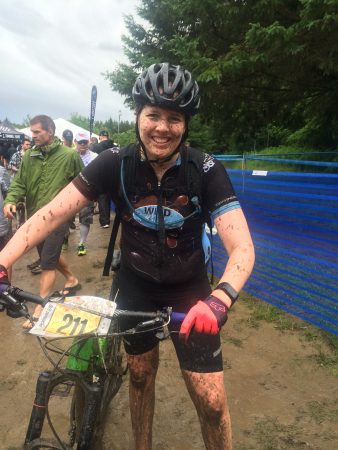
Dr. Duncan, how did you first get into engineering? What sparked your interest?
I first got into Engineering when I decided that pursuing a PhD in mechanical engineering would best suit my long-term goals of being a researcher in biomechanics. My previous undergraduate and Masters degrees in Kinesiology and Science with focuses in biomechanics and ergonomics had sparked a desire to learn more advanced biomechanical modeling techniques. A PhD in Mechanical Engineering allowed me to learn these advanced biomechanical modeling techniques while also gaining the foundational knowledge in mechanical and human factors engineering to pursue this career.
Hometown, family?
I’m originally from Rothesay, New Brunswick, Canada–about 45 minutes east of Maine. Interestingly, I come from a healthcare and teaching family. My parents were both public school teachers, and my grandparents were all healthcare professionals or engineers. I have one younger brother who is currently an electrician in Vancouver, British Columbia.
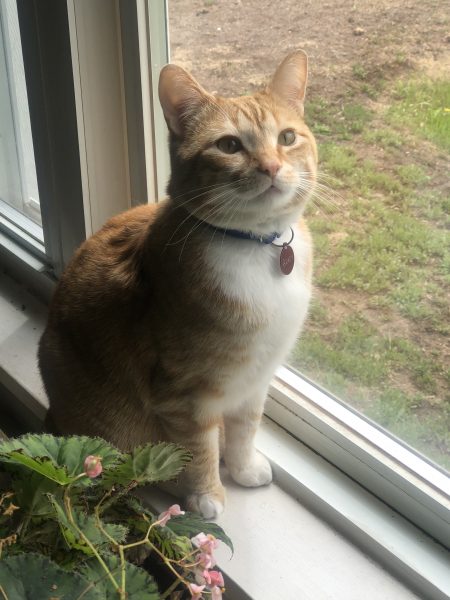
What do you like to do in your spare time?
I’m a member of the Mont Ripley Ski Patrol and Copper Harbor Bike Patrol. I’ve recently taken up Nordic skiing and disc golf. When I’m not outside I love to cook and am an avid indoor gardener. I have a two-year old ginger tabby cat named “Brady the Tomcat,” in honor of Tom Brady (I’m a lifelong New England Patriots fan). I found Brady at Copper Country Humane Society right here in Houghton.
Sarah, how did you first get into engineering? What sparked your interest?
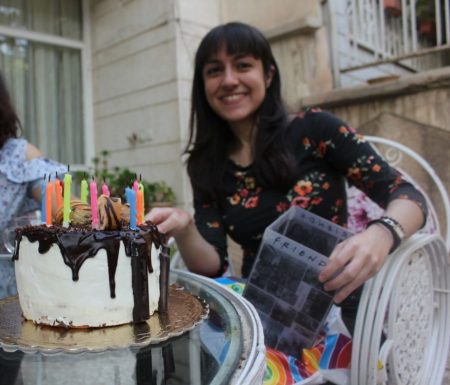
Growing up, I was always trying to figure out my real passion–some area in which I am really talented, so that I can direct all my attention and power toward it.
I tried out many things, including painting and playing piano. But, they were never enough for me. After getting admitted to the Iranian Biology Olympiad (IrBO) at age fourteen, and then, a year later, to the Iranian’s national Mathematics Olympiad, I started to realize that I may be good at both those fields (biology and math). That is why a couple of years later, I chose to pursue a biomedical engineering degree.
Hometown, family?
Until recently, I lived in Tehran, Iran. It is the capital of Iran. Very crowded, but it is very beautiful, with lots of beautiful countryside spots to go on picnics, like Chitgar Lake. Plus, there are two, three great places to go hiking.
We are a small family. I have a younger brother who also chose the engineering field. My dad is an agricultural engineer. My mum is a biotechnology researcher.
Any hobbies? Pets? What do you like to do in your spare time?
The first thing is that I love hiking; when I was in Iran I used to go hiking every two weeks.
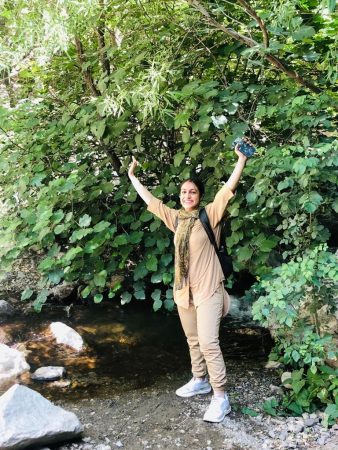
Another thing I am crazy about is learning new languages. I learn new languages by watching movies and listening to music. Recently I started learning Spanish. I love Spanish music. I memorized the lyrics and tried them out with karaoke!
And finally, I always enjoy chatting with my friends. Sometimes when I want to clear my head and not think of anything, I hang out with a friend.
Michigan Tech’s Department of Cognitive and Learning Sciences offers bachelor of science degrees in Psychology and Human Factors, along with a Minor in Psychology. We also offer an Accelerated Masters degree in Applied Cognitive Science and Human Factors (ACSHF), which typically requires only one additional year of course work. Our graduate program includes masters and doctoral degrees in Applied Cognitive Science and Human Factors (ACSHF).
Questions? Contact us at cls@mtu.edu. And follow us @clsmtu on Instagram and Facebook for the latest happenings.